IAHS News
Invitation to the Future of Sociohydrology Webinar
We are pleased to invite you to the upcoming webinar “Future of Sociohydrology”, organised as part of the Early Career Researcher (ECR) program for the 2nd International Sociohydrology Conference, to be held in Tokyo this July.
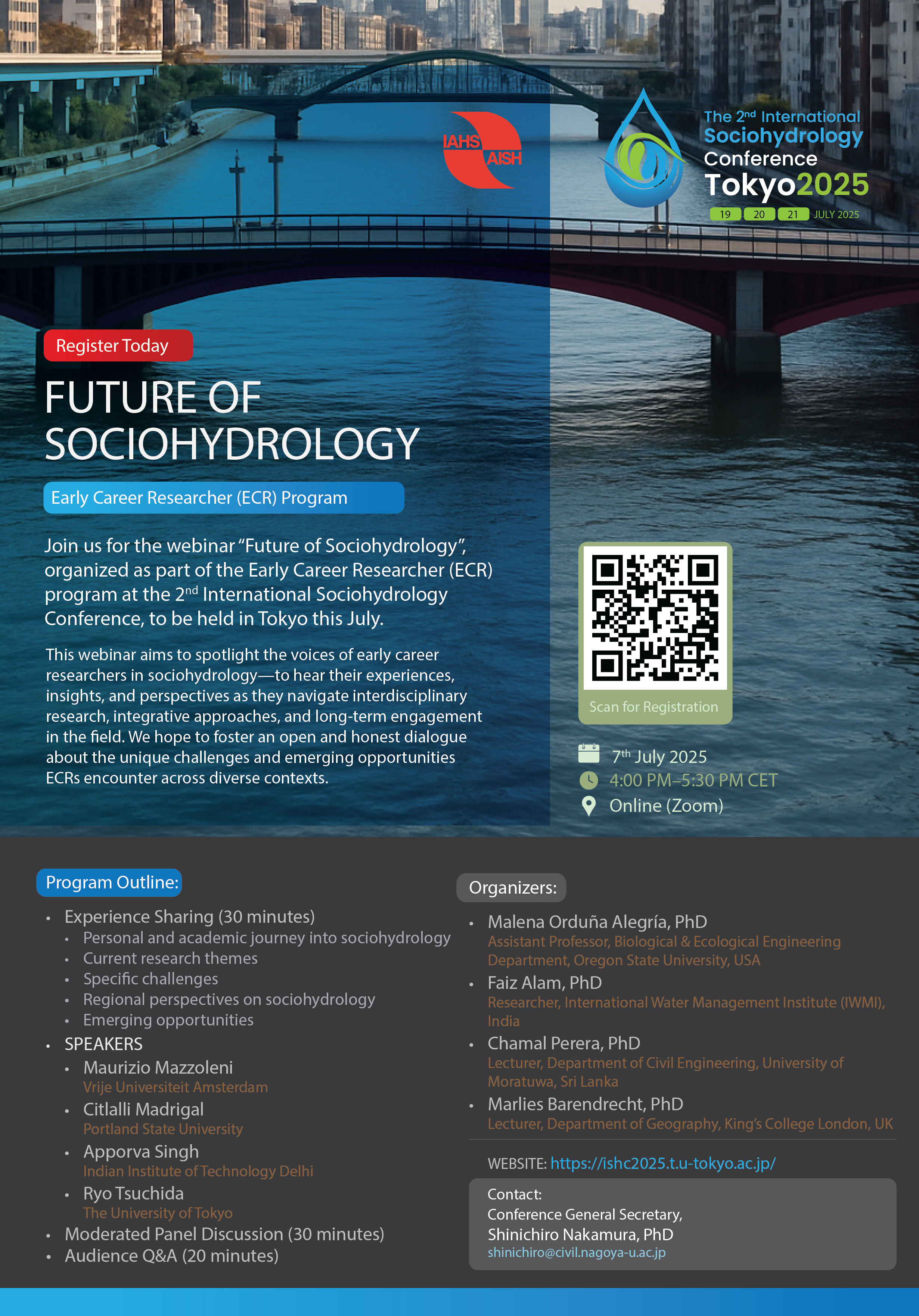
This webinar aims to spotlight the voices of early career researchers in sociohydrology—to hear their experiences, insights, and perspectives as they navigate interdisciplinary research, integrative approaches, and long-term engagement in the field. We hope to foster an open and honest dialogue about the unique challenges and emerging opportunities ECRs encounter across diverse contexts.
Event Details
Date: July 7, 2025
Time: 4:00 PM–5:30 PM CET
Format: Online (Zoom)
Registration: Click here. Once your registration is complete, you will receive an automatic email with the Zoom link for the event.
Program Outline
1.Experience Sharing (30 minutes). Each panellist will have up to 7 minutes to speak about one or more of the following:
- Their personal and academic journey into sociohydrology
- Current research or themes that inspire them
- Specific challenges they’ve faced and how they’ve addressed them
- Regional perspectives on sociohydrology
- Emerging opportunities in their context
2.Speakers:
- Maurizio Mazzoleni – Vrije Universiteit Amsterdam
- Citlalli Madrigal – Portland State University
- Ryo Tsuchida – The University of Tokyo
- Apoorva Singh (SYSTA Awardee) – Indian Institute of Technology Delhi
3.Moderated Panel Discussion (30 minutes)
4.Audience Q&A (20 minutes)
Organizers:
Malena Orduña Alegría, PhD – Assistant Professor, Biological & Ecological Engineering Department, Oregon State University
Faiz Alam, PhD – Researcher, International Water Management Institute (IWMI), India
Chamal Perera, PhD – Lecturer, Department of Civil Engineering, University of Moratuwa, Sri Lanka
Marlies Barendrecht, PhD – Lecturer, Department of Geography, King’s College London, UK.
We warmly invite you to join this thoughtful and forward-looking conversation on the future of sociohydrology!
2025 Falkenmark Award winner announced
The winner of the 2025 IAHS Falkenmark Award for best PhD thesis has been announced as Dr Vinícius Bogo Portal Chagas from Brazil for his PhD thesis entitled "Hydrological extremes in Brazil: Large-scale patterns, mechanisms, and change". He has provided significant contributions to the understanding of large-scale patterns, mechanisms, and climate change impacts on water availability and coupled hydrological extremes in South America.
The award ceremony is scheduled to take place during the upcoming IAHS Scientific Assembly in Roorkee, India from 5 - 10 October 2025.
Congratulations Vinícius!
The Falkenmark Award for best PhD thesis:
- Recognises outstanding contributions to hydrological understanding of water scarcity and water supply.
- Is granted every year, starting 2023 (nomination must be submitted no later than 31 December).
- Highlights the importance of capacity building and knowledge/data gathering in financially disadvantaged countries.
Eligible nominees:
- Grew up in a financially disadvantaged country.
- Performed the PhD work in one or more financially disadvantaged countries.
- Holds a PhD certificate, which is dated within the last 2 years.
Exploring New Horizons
IAHS and HSJ to join Bluesky for Hydrological Science Communication
![]()
The evolving landscape of social media presents IAHS with an important opportunity to reflect on how we engage with our global community. As part of our commitment to adapt our digital presence in line with IAHS values, strategic objectives, and member preferences, we are pleased to share our next step in this process.
While LinkedIn (both IAHS and HSJ) will remain our primary focus for social media engagement, we will also commence a trial of IAHS and HSJ accounts on the emerging platform Bluesky.
We have the following official Bluesky handles:
@iahs-aish.bsky.social for IAHS
@hsj-iahs.bsky.social for Hydrological Sciences Journal
We welcome feedback from the IAHS community as we explore the potential of this platform. Please email us at [email protected]
We warmly encourage IAHS members and followers who are already on Bluesky to connect with us on these accounts. If you are new to the platform, this is an excellent opportunity to explore it and stay connected with IAHS and HSJ as we continue to promote collaboration, visibility, and the advancement of hydrological science worldwide.
Thank you for your continued support in strengthening IAHS’s global visibility and collaboration.
Hydrological Sciences Journal (HSJ): The Official Journal of IAHS
We are pleased to reaffirm that the Hydrological Sciences Journal (HSJ) is the official journal of the International Association of Hydrological Sciences (IAHS).

Published since 1956, the Hydrological Sciences Journal (HSJ) is a globally recognised, peer-reviewed journal dedicated to the advancement of hydrology. It reflects the diverse, international, and interdisciplinary nature of our community and serves as a platform for innovative research, practical applications, and scientific dialogue.
As an IAHS member, you benefit from:
- Free access to HSJ through your IAHS membership if you are from a Financially Disadvantaged Country (FDC)
- Opportunities to submit your research to a respected, community-driven journal
- Publish in the HSJ for free
- The chance to support and shape the future of hydrological science.
We encourage all members to read, cite, and promote HSJ within their networks, working groups, and committees. Your engagement ensures the continued impact and relevance of hydrological research worldwide.
Thank you for your continued contributions to the IAHS community.
Giving you and your work visibility in the IAHS Digital Water Globe – Your Action is Needed
As part of our shared commitment to strengthening collaboration across the hydrological sciences, we are writing to encourage your engagement with the IAHS Digital Water Globe (DWG), if you have not done so already.
The Digital Water Globe is an innovative tool specially designed for, and by, IAHS members. Here you can give visibility to (un)published results, research sites, datasets and find peers for collaborating around the world. It is designed to promote visibility, foster connections, and stimulate interdisciplinary collaboration.
While many IAHS members have received their DWG login credentials, we have noted that some are yet to complete their Personal Profiles or begin using the platform. To fulfil the potential of the DWG and support its growth, we kindly urge you to log in and complete your Personal Profile as soon as possible. Setting up your Personal Profile requires just a few minutes. To assist with this, we have created a set of comprehensive guides, and you will find them on our IAHS DWG webpage. The process is intuitive, and your contribution will ensure your role and expertise are visible within the DWG.
If you have questions or need assistance accessing your account, we are here to help.
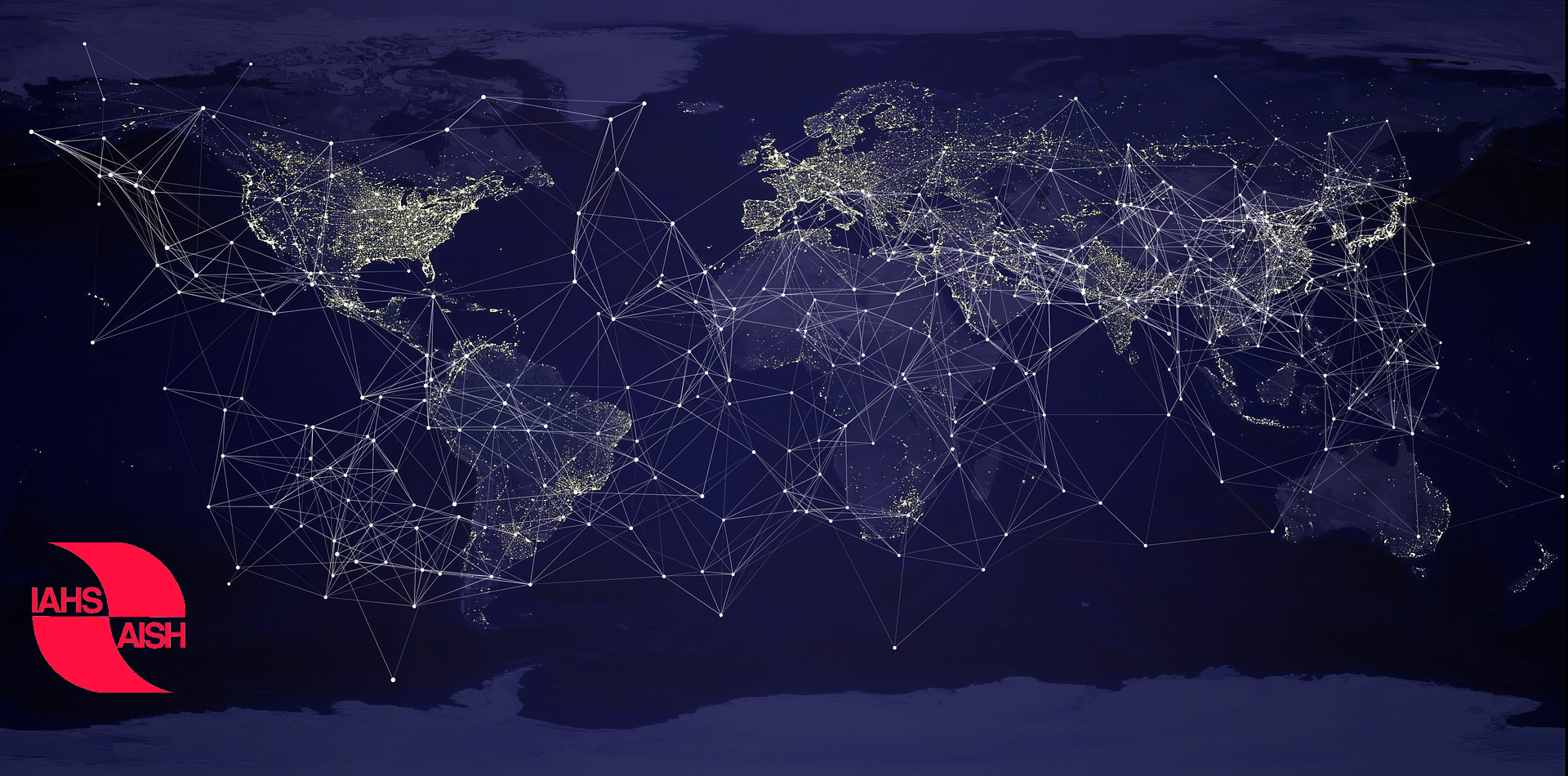
International Conference in Astana, Kazakhstan, from 17 - 21 November
The International Conference "Sediment and Pollutants Transport in River Catchments: Radionuclides and Fingerprinting Techniques Applications for Assessment, Monitoring, and Risk Prevention" will be held in Astana, the capital of Kazakhstan, at the Kazakhstan Branch of Lomonosov Moscow State University from 17-21 November 2025:
- 17 November: arrival day
- 18-20 November: conference program
- 21 November: departure day.
The conference will be held in person. Scientists working in the fields of erosion, fluvial processes, and sediment fingerprinting are warmly invited to participate. Click here to find out more about the conference, registration process, and abstracts submission.
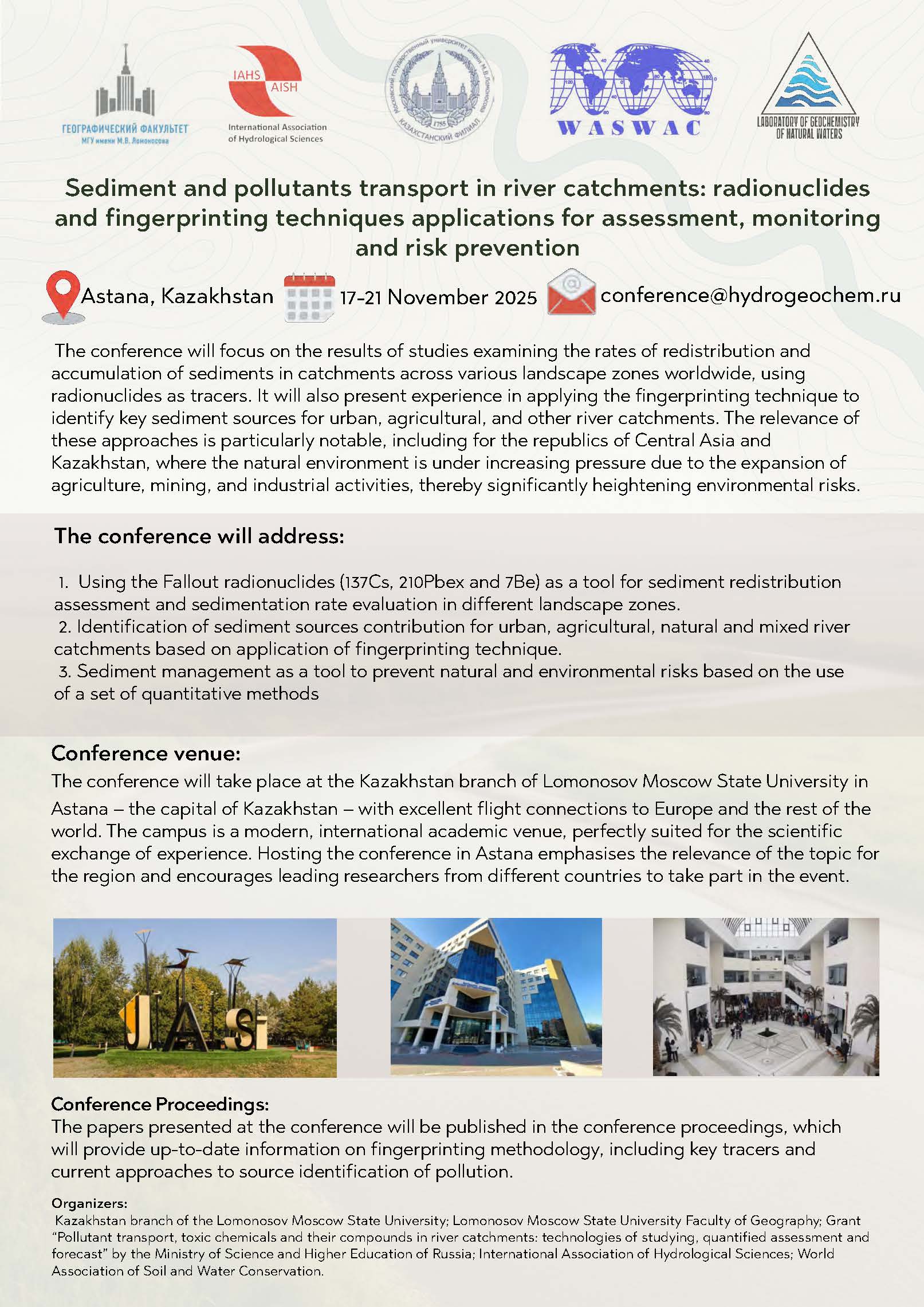
Early-Bird Registration for XIIth IAHS Scientific Assembly 2025 Extended Until 15 May!
The early-bird period, now open until 15 May 2025, offers discounted registration fees for students, delegates, and participants from financially disadvantaged countries (FDC), making it easier for a diverse and vibrant community to take part. Registration includes access to all scientific sessions, plenary lectures, workshops, conference materials, meals, local transportation, and social activities.
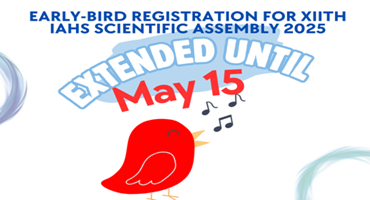
We encourage you to secure your spot today and join us for a week of inspiring science, meaningful dialogue, and international collaboration.
Detailed information on registration categories, fees, and benefits is available here.
IAHS at EGU2025
As we gear up for EGU2025, we are thrilled to unveil our focus on HELPING, the Digital Water Globe (DWG) and the Association. Here's a sneak peek at what we have in store...
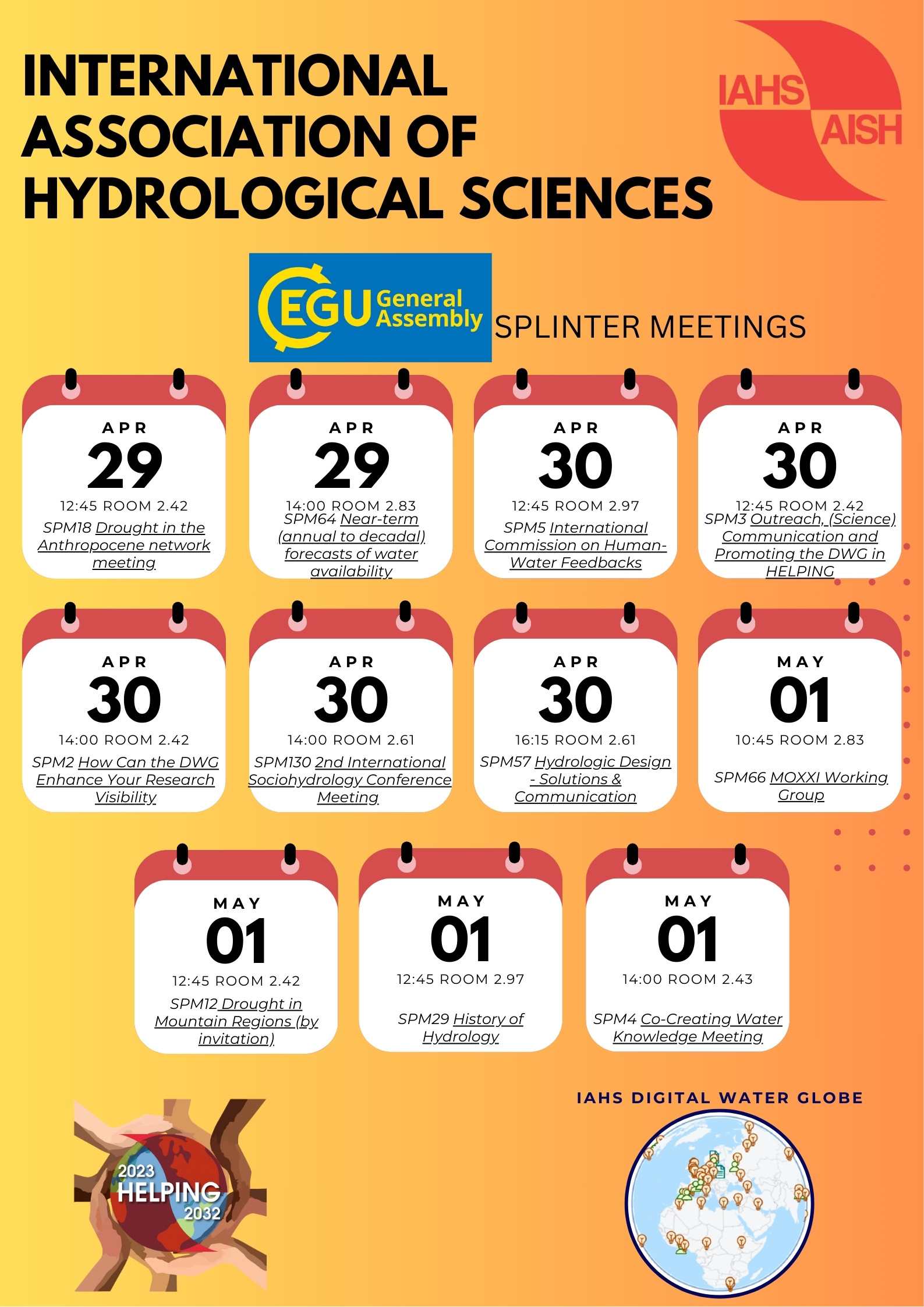
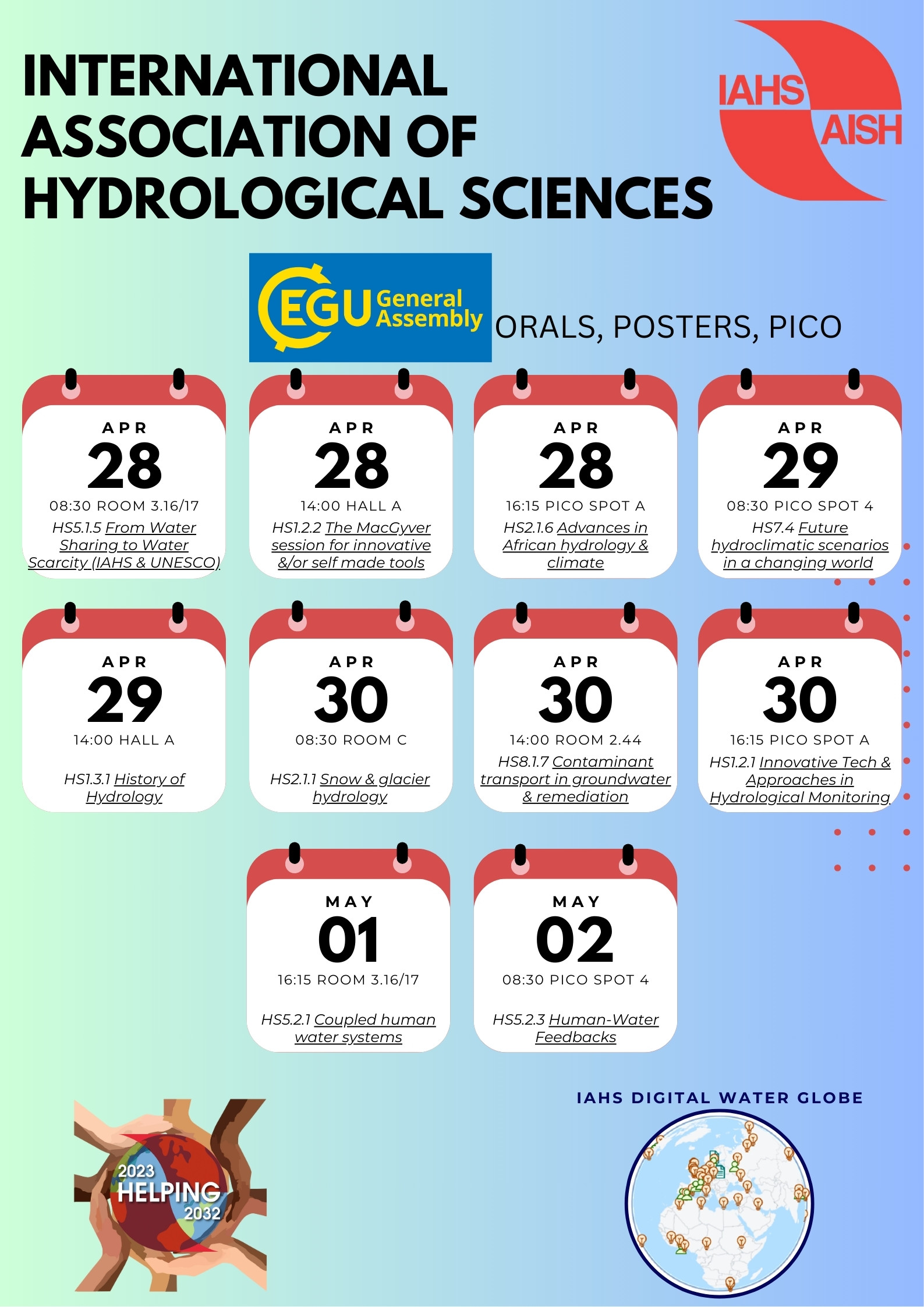
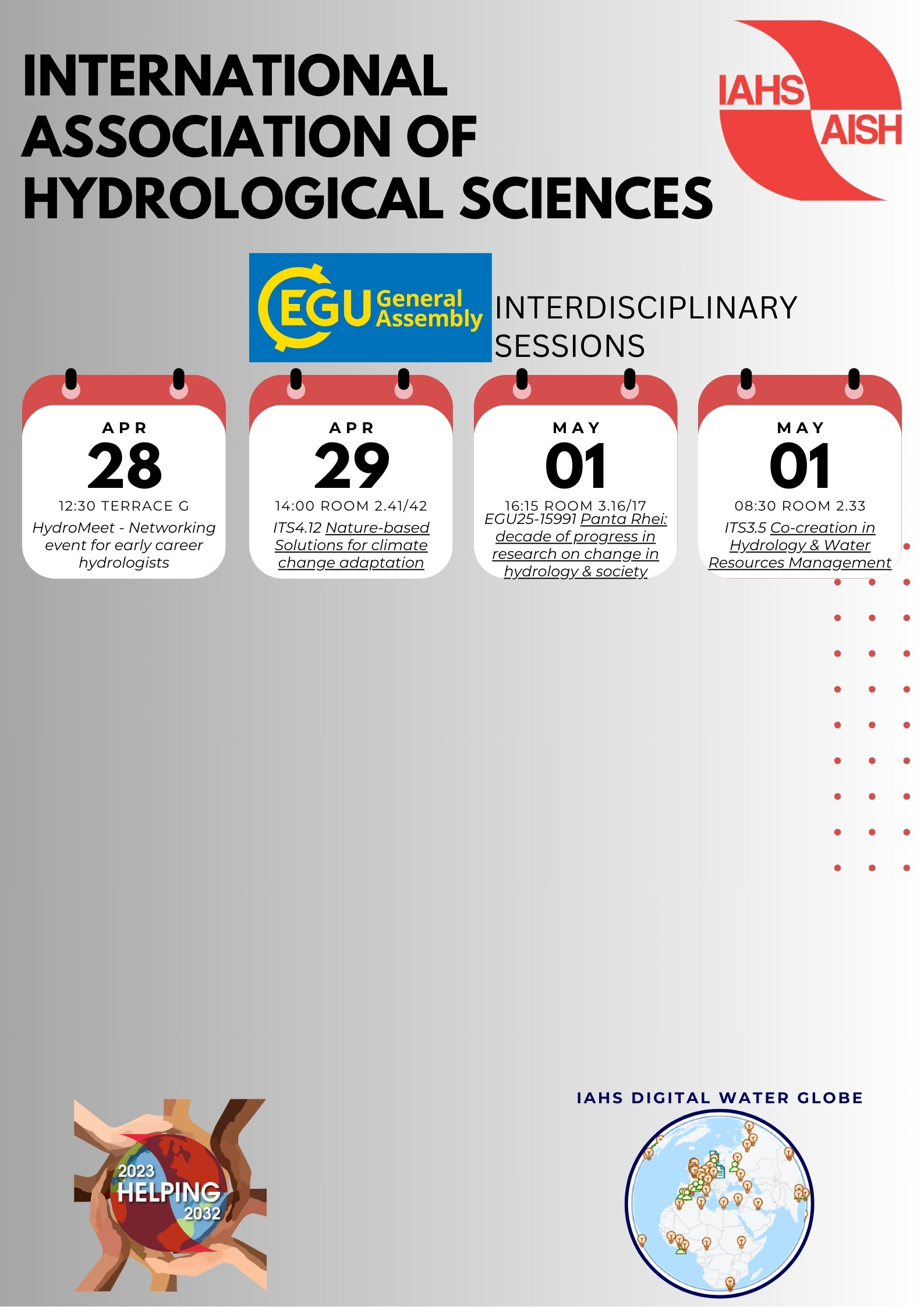
IAHS 2025 Early Bird Registration
The early bird registration for the XIIth IAHS Scientific Assembly in Roorkee this October, is set to close on 30 April 2025. So get your registration in now to avoid any disappointment!

2025 IAHS-UNESCO-WMO International Hydrology Prize
The International Hydrology Prize is awarded annually by IAHS, with UNESCO and WMO, to two people who have made an outstanding contribution to hydrological science. IAHS is pleased to announce the recipients of the International Hydrology Prize (Dooge medal and Volker medal) for 2025. This year's prize selection was especially competitive, with 15 nominations received, out of which 75% of the nominees were deemed outstanding, making this one of the most distinguished pools of candidates we have ever seen. The 2025 recipients emerged at the top of this highly accomplished group of excellency. Their contributions to hydrology have not only advanced scientific understanding but have also had a significant global impact.
Nominations for the annual Prize are made by National Committees to IAHS, National Committees to the UNESCO-IHP or National Hydrological Advisors to the WMO, and forwarded to the Secretary General of IAHS for consideration by the Nomination Committee. The Committee consists of the President and a Vice-President of IAHS and representatives of UNESCO and WMO.
The 2025 recipients of the IAHS-UNESCO-WMO International Hydrology Prize are:
- Dooge medal - For critical advancements to improve our understanding of climate warming as well as the cryosphere, hydrological processes, and hydrological predictions in cold regions and ungauged basins around the world - Prof. John Pomeroy, at the University of Saskatchewan, Department of Geography and Planning, in Canada.

- Volker medal - For outstanding original contributions, which have significantly benefited society by addressing critical issues of public interest and development, such as coupled human-flood and human-drought interactions - Prof. Giuliano Di Baldassarre, at the Uppsala University, Department of Earth Sciences, in Sweden.

The award ceremony is scheduled to take place in Roorkee, India during the IAHS Scientific Assembly from 5-10 October 2025.
We extend our warmest congratulations to the winners and express our deep appreciation to all nominees and nominators. Several of the candidates would undoubtedly have been awarded the prize in any other year, and we encourage renewed nominations in the future. This year’s process clearly demonstrates the value and prestige associated with the International Hydrology Prize and reaffirms its role in recognising the world’s leading hydrological scientists.
